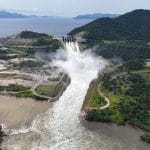The European Commission published on July 29 new technical guidance that will help mainstream climate considerations in future investment and development of infrastructure projects from buildings, network infrastructure to a range of built systems and assets for the period 2021-2027. That way, institutional and private European investors will be able to make informed decisions on projects deemed compatible with the Paris Agreement and the EU climate objectives, the Commission said, noting that the guidance adopted on July 29 will thus help the EU deliver the European Green Deal, implement requirements under the European Climate Law and make EU spending greener. It is aligned with a greenhouse gas emission reduction pathway of -55% net emissions by 2030 and climate neutrality by 2050; follows the ‘energy efficiency first’ and ‘do no significant harm’ principles; and fulfils requirements set out in the legislation for several EU funds such as InvestEU, Connecting Europe Facility (CEF), European Regional Development Fund (ERDF), Cohesion Fund (CF) and the Just Transition Fund (JTF).
The impacts of climate change are already having repercussions for assets and infrastructure with long lifetimes such as railways, bridges or power stations, and these impacts are set to intensify in the future. For example, building in areas that are likely to be affected by sea level rise requires particular attention; similarly, heat tolerance for railway tracks needs to account for the projected higher maximum temperature rather than historical values. It is therefore essential to clearly identify – and consequently to invest in – infrastructure that is prepared for a climate-neutral and climate-resilient future, the Commission said.
Climate-proofing is a process that integrates climate change mitigation and adaptation measures into the development of infrastructure projects. The technical guidance adopted today sets out common principles and practices for the identification, classification and management of physical climate risks when planning, developing, executing and monitoring infrastructure projects and programmes. The process is divided into two pillars (mitigation, adaptation) and two phases (screening, detailed analysis) and the documentation and verification of climate-proofing forms is considered an essential part of the rationale for making investment decisions.
Specifically, for infrastructure with a lifespan beyond 2050, the guidance stipulates that the operation, maintenance and final decommissioning of any project should be carried out in a climate-neutral way, which may include circular economy considerations, such as the recycling or repurposing of materials, the Commission said, adding that the climate resilience of new infrastructure projects should be ensured through adequate adaptation measures, based on a climate risk assessment.







